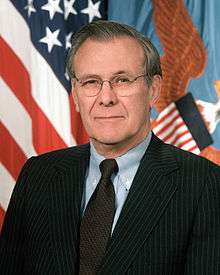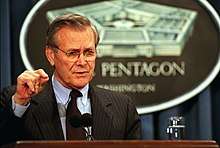
[T]he only way there’s going to be followers, is if the leader is doing things that have merit, that are persuasive to others. Why else would someone follow somebody if they didn’t think the individual was doing something worthwhile, going in the right direction?
Donald Rumsfeld (born 9 July 1932) was the 21st United States Secretary of Defense, serving from 2001 to 2006, succeeded by Robert Gates. He also served as the 13th Defense Secretary in 1975–1977 under President Ford, and in other roles under various presidents.
Quotes

It is easier to get into something than to get out of it.

There are known knowns; there are things we know we know. We also know there are known unknowns; that is to say we know there are some things we do not know. But there are also unknown unknowns — the ones we don't know we don't know. And if one looks throughout the history of our country and other free countries, it is the latter category that tend to be the difficult ones.
1960s
- It's a difficult thing today to be informed about our government even without all the secrecy.
- As quoted in The Chicago Tribune (13 April 1966)
1970s
- Congress, the press, and the bureaucracy too often focus on how much money or effort is spent, rather than whether the money or effort actually achieves the announced goal.
- Be able to resign. It will improve your value to the President and do wonders for your performance.
- This war [in Vietnam] has been marked by so many lies and evasions... that it is not right to have the war end with one last lie.
- In April 1975, as quoted in "How 'Vice' Explains Trump's Appeal" (6 January 2019), by Matt Latimer, POLITICO
2000s
- Reports that say that something hasn't happened are always interesting to me, because as we know, there are known knowns; there are things we know we know. We also know there are known unknowns; that is to say we know there are some things we do not know. But there are also unknown unknowns — the ones we don't know we don't know. And if one looks throughout the history of our country and other free countries, it is the latter category that tend to be the difficult ones.
- The absence of evidence is not evidence of absence, or vice versa.
- Department of Defense news briefing (12 February 2002)
- Variant:
- Now what is the message there? The message is that there are no "knowns." There are things we know that we know. There are known unknowns. That is to say there are things that we now know we don't know. But there are also unknown unknowns. There are things we do not know we don't know. So when we do the best we can and we pull all this information together, and we then say well that's basically what we see as the situation, that is really only the known knowns and the known unknowns. And each year, we discover a few more of those unknown unknowns.
- It sounds like a riddle. It isn't a riddle. It is a very serious, important matter.
- There's another way to phrase that and that is that the absence of evidence is not evidence of absence. It is basically saying the same thing in a different way. Simply because you do not have evidence that something exists does not mean that you have evidence that it doesn't exist. And yet almost always, when we make our threat assessments, when we look at the world, we end up basing it on the first two pieces of that puzzle, rather than all three.
- Extending on his earlier comments in a press conference at NATO Headquarters, Brussels, Belgium (6 June 2002)
- I can't tell you if the use of force in Iraq today would last five days, or five weeks, or five months, but it certainly isn't going to last any longer than that.
- And it is not knowable if force will be used, but if it is to be used, it is not knowable how long that conflict would last. It could last, you know, six days, six weeks. I doubt six months.
- Then there are three or four countries that have said they won't do anything. I believe Libya, Cuba and Germany are ones that have indicated they won't help in any respect.
- Now, you're thinking of Europe as Germany and France. I don't. I think that's old Europe.
- I picked up a newspaper today and I couldn't believe it. I read eight headlines that talked about chaos, violence, unrest. And it just was Henny Penny -- "The sky is falling." I've never seen anything like it! And here is a country that's being liberated, here are people who are going from being repressed and held under the thumb of a vicious dictator, and they're free. And all this newspaper could do, with eight or 10 headlines, they showed a man bleeding, a civilian, who they claimed we had shot —one thing after another.
From the very beginning, we were convinced that we would succeed, and that means that that regime would end. And we were convinced that as we went from the end of that regime to something other than that regime, there would be a period of transition. And, you cannot do everything instantaneously; it's never been done, everything instantaneously. We did, however, recognize that there was at least a chance of catastrophic success, if you will, to reverse the phrase, that you could in a given place or places have a victory that occurred well before reasonable people might have expected it, and that we needed to be ready for that; we needed to be ready with medicine, with food, with water. And, we have been.
Freedom's untidy, and free people are free to make mistakes and commit crimes and do bad things. They're also free to live their lives and do wonderful things. And that's what's going to happen here.
- I don't believe anyone that I know in the administration ever said that Iraq had nuclear weapons.
- At a hearing of the Senate's appropriations subcommittee on defense (14 May 2003)
- You and a few other critics are the only people I've heard use the phrase immediate threat. I didn't, the president didn't. And it's become kind of folklore that that's what's happened.
- CBS Face the Nation (14 March 2004); in response Thomas Friedman quoted his previous statement from a hearing before the House Armed Services Committee (10 September 2002):
- But no terrorist state poses a greater or more immediate threat to the security of our people and the stability of the world than the regime of Saddam Hussein in Iraq.
- I'm not into this detail stuff. I'm more concepty.
- Look at me! I'm sweet and lovable!
- http://www.defenselink.mil/Transcripts/Transcript.aspx?TranscriptID=3516 Foreign Press Center (21 June 2002)]
- [ Osama bin Laden is] either alive and well or alive and not too well or not alive.
- I stand for 8-10 hours a day. Why is standing limited to four hours?
- We're so conditioned as a people to think that a military campaign has to be cruise missiles and television images of airplanes dropping bombs, and that's just false. This is a totally different war. We need a new vocabulary. We need to get rid of old think and start thinking about this thing the way it really is.
- We know where they [Iraq's WMD] are. They're in the area around Tikrit and Baghdad and east, west, south, and north somewhat....I would also add, we saw from the air that there were dozens of trucks that went into that facility after the existence of it became public in the press and they moved things out. They dispersed them and took them away. So there may be nothing left. I don't know that. But it's way too soon to know. The exploitation is just starting.
- Interview with George Stephanopoulos on ABC News This Week, March 30, 2003
- I didn't advocate invasion…I wasn't asked.
- Responding to George Stephanopoulos about whether he would have advocated an invasion of Iraq if he had known that no weapons of mass destruction would be found there, ABC News This Week, November 20, 2005
- …it seems to me that it's up to all of us to try to tell the truth, to say what we know, to say what we don't know, and recognize that we're dealing with people that are perfectly willing to, to lie to the world to attempt to further their case and to the extent people lie of, ultimately they are caught lying and they lose their credibility and one would think it wouldn't take very long for that to happen dealing with people like this.
- From the 2004 documentary film Control Room
- As you know, you go to war with the army you have, not the army you might want or wish to have at a later time. Since the Iraq conflict began, the Army has been pressing ahead to produce the armor necessary at a rate that they believe -- it's a greatly expanded rate from what existed previously, but a rate that they believe is the rate that is all that can be accomplished at this moment.
- "Troops put Rumsfeld in the hot seat". CNN. 2004-12-08. Retrieved on 2006-04-07.
- Responding to the question "Now why do we soldiers have to dig through local landfills for pieces of scrap metal and compromised ballistic glass to up armor our vehicles, and why don't we have those resources readily available to us?"
- I shouldn't get into … this is diplomacy, and I don't do diplomacy.
- We do have a saying in America: if you're in a hole, stop digging ..... erm, I'm not sure I should have said that.
- Well, so be it. Nothing's perfect in life, so you have an election that's not quite perfect. Is it better than not having an election? You bet.
- It recalls to mind the statement by Winston Churchill, something to the effect that: I have benefited greatly from criticism, and at no time have I suffered a lack thereof.
- During the Nomination of Robert Gates for the next U.S. Secretary of Defense, November 8, 2006
- It is pretty clear that the coalition can win in Afghanistan and Iraq in one way or another, but it will be a long, hard slog.
- referring to the ongoing War on Terrorism
- Those who follow orders to commit such crimes will be found and they will be punished. War crimes will be prosecuted. And it will be no excuse to say, 'I was just following orders.' Any official involved in such crimes will forfeit hope of amnesty or leniency with respect to past action.
- Oh, Lord. I didn't mean to say anything quotable.
- Let's hear it for the essential daily briefing, however hollow and empty it might be. We'll do it.
- There will be good moments, and there will be less good moments.
- I don't know what the facts are but somebody's certainly going to sit down with him and find out what he knows that they may not know, and make sure he knows what they know that he may not know, and that's a good thing.
- Talking to reporters about whether President Bush knows about equipment inadequacies in Iraq
- Pieces of intelligence, scraps of intelligence…you run down leads and you run down leads, and you hope that sometimes it works.
- And there is, I am certain, among the Iraqi people a respect for the care and the precision that went into the bombing campaign.
- Stuff happens.
- I suppose the implication of that is the president and the vice president and myself and Colin Powell just fell off a turnip truck to take these jobs.
- In response to Jeffrey Goldberg's question to comment on accusations that the "Jewish lobby" maneuvered the administration into war. The New Republic, October 8, 2007.
2010s
- After he saw what happened to Saddam Hussein, he (Gaddafi) did not want to be Saddam Hussein. He gave up his nuclear program.
- Rumsfeld doesn't support sending U.S. troops into Libya March 9, 2011.
- The natural state of man is to want to be free. To have opportunities. To have choices.
- On Arab Spring, Rumsfeld, that he wasn't surprised by popular uprisings of Libya, Egypt, and Tunisia. March 9, 2011.
- And the only way there’s going to be followers, is if the leader is doing things that have merit, that are persuasive to others. Why else would someone follow somebody if they didn’t think the individual was doing something worthwhile, going in the right direction?
- As quoted in "My Date With Rummy: Now 84, The Former Secretary Of Defense Is As Wily As Ever" (12 June 2017), by Adam Linehan, Task & Purpose
Quotes about Rumsfeld
- He's a ruthless little bastard. You can be sure of that.
- In the Vietnam War, the leaders of the White House claimed at the time that it was a necessary and crucial war, and during it, Donald Rumsfeld and his aides murdered two million villagers. And when Kennedy took over the presidency and deviated from the general line of policy drawn up for the White House and wanted to stop this unjust war, that angered the owners of the major corporations who were benefiting from its continuation. And so Kennedy was killed, and al-Qaida wasn't present at that time, but rather, those corporations were the primary beneficiary from his killing. And the war continued after that for approximately one decade. But after it became clear to you that it was an unjust and unnecessary war, you made one of your greatest mistakes, in that you neither brought to account nor punished those who waged this war, not even the most violent of its murderers, Rumsfeld.
- Osama bin Laden, as quoted in Not Popular.
- We are paying a very heavy price for the mismanagement — that's the kindest word I can give you — of Donald Rumsfeld, of this war. The price is very, very heavy and I regret it enormously. I think that Donald Rumsfeld will go down in history as one of the worst secretaries of defense in history.
- John McCain
- Associated Press (2007-02-19). "McCain blasts Rumsfeld for Iraq war missteps". MSNBC.com. Retrieved on 2007-02-20.
- Here's what I can tell you about Don Rumsfeld. You're never going to get any credit. And you'll only know how well you're doing if he gives you more work. If that happens, you're doing fine.
- Dick Cheney, U.S. Vice President, Quoted in Bob Woodward's State of Denial: Bush at War, Part III, Simon & Schuster, 2006
- Rumsfeld told a group of senior Pentagon aides, “I never again want our army to arrive somewhere and meet the CIA on the ground.” To a gathering of top generals in “the tank,” the Joint Chiefs' secure conference room, he was even more succinct: “Every CIA success,” he told them, “is a DoD failure.”
- Ron Suskind, The One Percent Doctrine (2006)
External links
- The Donald Rumsfeld "Library of Quotations" from Broadcasting House, a BBC Radio 4 current affairs show which used to run a "Donald Rumsfeld soundbite of the week".
- Other quotes from Slate.
- That's Life: The poetry of Donald Rumsfeld, Volume 2.
- Timeline of monthly quotes on the buildup of Iraqi security forces
This article is issued from
Wikiquote.
The text is licensed under Creative
Commons - Attribution - Sharealike.
Additional terms may apply for the media files.